初中英语语法大全PPT课件
合集下载
初中英语语法PPT课件
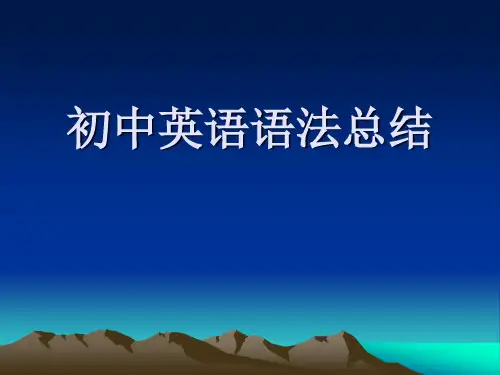
• 5. She __________ (not want) to stay in bed whi le the others ________________ (all, work) in th e fields.
过去完成时
• 构成: • had+动过去分词 • 多用于复合句中
• 用法: • 该动作发生在过去的过去
• 构成: • 动词用过去时 • Be—was/ were
• 用法: • 表过去某个、段时间内动作及状态
• 象征词: • ago/just now /In1998 last/yesterday 等
一般过去时
• 规则变化: • 一般/去e 双写/辅+y结尾-ied • 不规则变化: • go-went come-came • do-did leave-left等
• 用法: • 表示经常性的 • 动作或状态
• 象征词: • Every often always on 天 in月、季、节、年。
一般现在时
• 规则变化: • 一般-s –es 辅音+y---ies • 不规则变化: • have----has
• 例句: • He goes to school every day. • I often have lunch at home.
• A. will be; is B. is; is C. will be; will be D. is; will be
现在进行时
• 构成: • be+doing
• 用法: • 表此时此刻正进行的动作或状 time Don’t…
过去进行时
• 构成: • was / were +doing • 多用于复合句中
• 用法: • 表在过去某时间正在进行的动作
过去完成时
• 构成: • had+动过去分词 • 多用于复合句中
• 用法: • 该动作发生在过去的过去
• 构成: • 动词用过去时 • Be—was/ were
• 用法: • 表过去某个、段时间内动作及状态
• 象征词: • ago/just now /In1998 last/yesterday 等
一般过去时
• 规则变化: • 一般/去e 双写/辅+y结尾-ied • 不规则变化: • go-went come-came • do-did leave-left等
• 用法: • 表示经常性的 • 动作或状态
• 象征词: • Every often always on 天 in月、季、节、年。
一般现在时
• 规则变化: • 一般-s –es 辅音+y---ies • 不规则变化: • have----has
• 例句: • He goes to school every day. • I often have lunch at home.
• A. will be; is B. is; is C. will be; will be D. is; will be
现在进行时
• 构成: • be+doing
• 用法: • 表此时此刻正进行的动作或状 time Don’t…
过去进行时
• 构成: • was / were +doing • 多用于复合句中
• 用法: • 表在过去某时间正在进行的动作
初中英语语法大全课件

(1)构成名词的后缀常用的有-ence,-(e)r/ -or (从事某事的人),-ese (某地人),-ess (雌性),-ful (一……),-ian (精通……的人),-ist (专业人员),-ment (性质;状态),-ness (性质;状态),-tion(动作;过程)等。例如: differ不同于→difference区别 write写→writer作家 Japan日本→Japanese日本人 act表演→actress女演员 mouth口→mouthful一口 music音乐→musician音乐家 racial种族的----racialist种族主义者
01
合成形容词
02
名词+形容词snow-white雪白的
03
名词+现在分词English-speaking讲英语的
04
名词+to+名词face-to-face面对面的
05
名词+过去分词man-made人造的
06
数词+名词one-way单行的
07
数词+名词+形容词two-year-old两岁的
动词转化为名词
很多动词可以转化为名词,大多意思没有多大的变化(如下①);有时意思有一定变化(如下②);有的与一个动词和不定冠词构成短语,表示一个动作(如下③)。例如:
Let's go out for a walk.我们到外面去散散步吧。
He is a man of strong build.他是一个体格健壮的汉子。
构成副词的常用后缀有-ly (主要用于形容词之后表示方式或程度),-ward(s) (主要用于表示方位的词之后表示方向)。
例如:
angry生气的→angrily生气地
to到→towards朝……,向……
初一英语英语语法总结(共51张PPT)
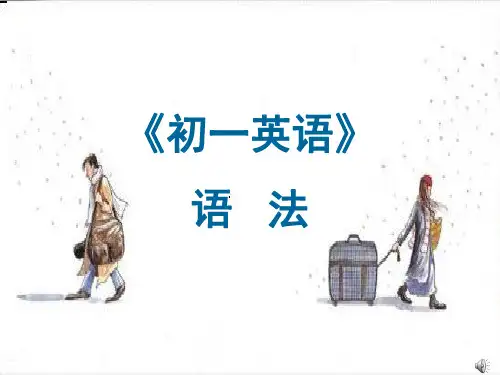
一、名词
个体名词
普通名词
具体名词
集体名词
名
专有名词
词 抽象名词
单数
名 可数名词 复数 词
不可数名词
英语语法中,名词有两种数的形式: 1)单数(表示一个人或事物); 2)复数(表示多于一个的人或数)。 只有可数名词才有复数形式。
名词的数:
名词复数形式的构成
形式
变化规则
发音
例词
一般情况
+s
1. 清辅音结尾的名词后[s] 2. 浊辅音结尾的名词后[z]; 3. 元音结尾的名词后[z];
2. 在某些度量表示法中: We have PE lessons three times a week.
3. 用在单数的表语名词前,以表示职业、行业、宗教、等级等。 George wants to be an engineer.
4. 在以what引导的感叹句中,单数的可数名词前。 What a pretty girl!
Be动词
am, is, are was, were
been
is 1. He ________ very good at English.
Practise
are 2. My father and I ________ going to Beijing next month. Were 3. ________ you on duty the day before yesterday?
3. 用在后面跟有限定性介词短语的名词前。 the letter from America, the fourteenth of April
4. 用在泛指的乐器名词前。 He plays the piano.
5. 一些常用短语。 by the way, in the morning, What’s the matter?
图解初中英语语法ppt课件
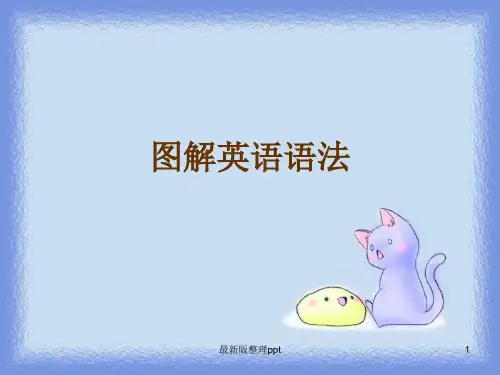
21
虚拟语气
最新版整理ppt
22
被动语态
最新版整理ppt
23
附加问句
最新版整理ppt
24
关系代词
最新版整理ppt
25
关系代词that
最新版整理ppt
26
从句
最新版整理ppt
27
倒装句
最新版整理ppt
28
倒装句
最新版整理ppt
29
最新版整理ppt
30
图解英语语法
最新版整理ppt
1
什么是语法?
最新版整理ppt
2
一般现在时vs.一般过去时
最新版整理ppt
3
一般将来时
最新版整理ppt
4
进行时
最新版整理ppt
5
进行时
最新版整理ppt
6
完成时
最新版整理ppt
7
完成时
最新版整理ppt
8
完成进行时
最新版整理ppt
9
完成进行时
最新版整理ppt
10
形容词
最新版整理ppt
11
形容词
最新版整理ppt
12
副词
最新版整理ppt
13
动词短语
最新版整理ppt
14
系动词
最新版整理ppt
15
感官动词
最新版整பைடு நூலகம்ppt
16
动名词
最新版整理ppt
17
不定式
最新版整理ppt
18
连词
最新版整理ppt
19
介词
最新版整理ppt
20
短语
最新版整理ppt
初中英语零基础学语法--英语句子结构 课件(共43张PPT)
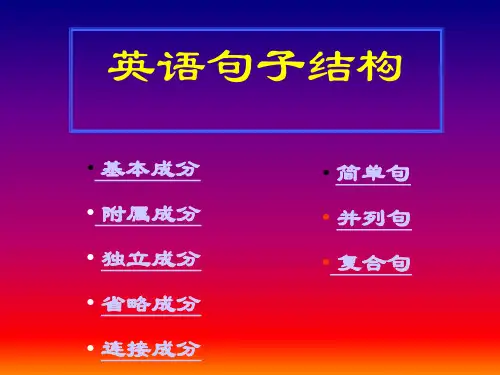
附属成分
基本成分的修饰语。可以是: • 定语:即用来修饰名词的单词、短语或从句 • 状语:即用来修饰名词或代词以外的词的单词、短语或从句。
定语
Poor John tottered toward a hospital nearby. She likes oranges imported from the USA.
省略成分
句中被省略的成分,虽然未说出来,却在句中表示 一定的意思:
(You) Come here. (I wish you)Good luck! Some gave him praises,but others(gave him)rotten eggs.
He runs as fast as, if ( he does ) not ( run ) faster, than you. ( I ) Hope you like it. John should clean the room today and Peter ( should clean it ) tomorrow.
主语、动词(不及物动词、及物动词、双宾动词、系动词、宾 补动词)、宾语及补语可以称为基本句子成分。完整的句子一 般至少包含2个基本成分,至多4个基本成分。
Vi(不及物动词)
主 语
谓 语
Vt(及物动词)
宾语 宾语(直) 宾语(间) 宾语 宾补
系动词
表语
be / feel / seem / look appear / stand / lie become /get / grow / turn go / come / remain/ keep taste / smell etc.
连接成分
连接成分实际上是一个连词,用来连接两个或几个平行的词、
初中英语语法讲解PPT课件
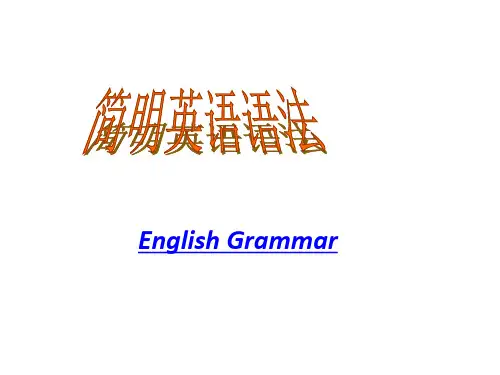
双重所有格(of+’s的两种结合)
• P11-13 (textbook) • 做练习 • 作业 列出有关名词一讲疑惑不解或易错的5- 10个难点.
第二讲 冠词和数词
•
冠词是虚词,本身不能单独使用,也没有词义,它用在名词的前面,帮助指明名词 的含义。英语中的冠词有三种,一种是定冠词(the Definite Article),另一种是不定 冠词(the Indefinite Article),还有一种是零冠词(Zero Article)。 2.1不定冠词的用法 不定冠词a (an)与数词one 同源,是"一个"的意思。a用于辅音音素前,一般读作 [e],而an则用于元音音素前,一般读做[en]。 1) 表示"一个",意为one;指某人或某物,意为a certain。 A Mr. Ling is waiting for you.
2) 以o 结尾的名词,变复数时: a. 加s,如: photo---photos piano---pianos radio---radios zoo---zoos; b. 加es,如:potato--potatoes tomato--tomatoes c. 均可,如:zero---zeros / zeroes 3) 以f或fe 结尾的名词变复数时: a. 加s,如: belief---beliefs roof---roofs safe---safes gulf---gulfs; b. 去f,fe 加ves,如:half---halves knife---knives leaf---leaves wolf---wolves wife---wives life---lives thief---thieves; c. 均可,如: handkerchief: handkerchiefs / handkerchieves
中考英语语法专项复习课件(共25张PPT)
shall/will be done am/is/are been done
was/were being done
was/were being done
情态动词+be+done
• They play football on Sunday.
Practice
Football is played by them on Sunday.
They used this room for resting.
This room was used for resting by them.
We will have a sports meeting next week.
A sports meeting will be had by us next week.
bought Which is the picture that ______you _____ ______ last week?
专题三 被动语态
时态
被动语态结构
表格:被动态基本结构 一般现在时
一般过去时
一般将来时 现在进行时 过去进行时 现在完成时 过去完成时
am/is/are done
was/were done
客观真理 自然现象 公式定理 名言警句 时态不变
陈述句
He will be back in an hour. The teacher says. says that The teacher ____ ____he will be back in an hour.
一般疑问句
Does he like English? I wonder. If he _____ likes English. I wonder _____ ____
was/were being done
was/were being done
情态动词+be+done
• They play football on Sunday.
Practice
Football is played by them on Sunday.
They used this room for resting.
This room was used for resting by them.
We will have a sports meeting next week.
A sports meeting will be had by us next week.
bought Which is the picture that ______you _____ ______ last week?
专题三 被动语态
时态
被动语态结构
表格:被动态基本结构 一般现在时
一般过去时
一般将来时 现在进行时 过去进行时 现在完成时 过去完成时
am/is/are done
was/were done
客观真理 自然现象 公式定理 名言警句 时态不变
陈述句
He will be back in an hour. The teacher says. says that The teacher ____ ____he will be back in an hour.
一般疑问句
Does he like English? I wonder. If he _____ likes English. I wonder _____ ____
初中英语语法课件ppt
vacation together.
过去将来时的使用:
一、过去将来时表示对于过去某一时间而言将要发生的动 作或存在的状态。 would或was /were going to + V
would可用于各种人称。
二、would +V还可表示过去的习惯动作,在这点上同used to同义。
When we were children, we would/used to go swimming every summer.
e) 用于条件从句“如果……想,设想”(接近if ……want to,或 if ……should) 例:Greater efforts to increase agricultural production must be made if food shortage ____________ avoided. A) is to be B) can be C) will be D) has been
一般现在时的动词形式: 动词原形 1.am;is ;are 2.have,has 3.第三人称单数形式-(e)s
肯定句:I watch television every day.
否定句:I don’t watch television every day.
疑问句:Do you watch television every day.
一般现在时的使用:
1.一般现在时表示总是、通常、习惯 性的动作或状态。
It snows in winter. I watch television every day.
2.用于对客观事实的普遍性的陈述。
Water consists of hydrogen and oxygen. Most animals kill only for food. The world is round.
过去将来时的使用:
一、过去将来时表示对于过去某一时间而言将要发生的动 作或存在的状态。 would或was /were going to + V
would可用于各种人称。
二、would +V还可表示过去的习惯动作,在这点上同used to同义。
When we were children, we would/used to go swimming every summer.
e) 用于条件从句“如果……想,设想”(接近if ……want to,或 if ……should) 例:Greater efforts to increase agricultural production must be made if food shortage ____________ avoided. A) is to be B) can be C) will be D) has been
一般现在时的动词形式: 动词原形 1.am;is ;are 2.have,has 3.第三人称单数形式-(e)s
肯定句:I watch television every day.
否定句:I don’t watch television every day.
疑问句:Do you watch television every day.
一般现在时的使用:
1.一般现在时表示总是、通常、习惯 性的动作或状态。
It snows in winter. I watch television every day.
2.用于对客观事实的普遍性的陈述。
Water consists of hydrogen and oxygen. Most animals kill only for food. The world is round.
初中英语语法PPT精品课件
day .
• 练习题:
• 1. Li Ming said he _____happy if Brian_____to China ne xt month.
• A. as; come B. was; would come C. would be; came D.
will be; come
• 2. Jenny said she _____her holiday in China.
• 例句: • Are you going to read ? • He is coming tomorrow .
• 练习题:
• 1. There __________ a meeting tomorrow after noon. A. will be going to B. will going to be C. is going to be D. will go to be
• 2. Charlie ________ here next month.
• A. isn't working B. doesn't working C. isn't g oing to working D. won't work
• 3. He ________ very busy this week, he _____ ___ free next week.
• A. will be; is B. is; isБайду номын сангаасC. will be; will be D. is; will be
现在完成时
• 构成: • have / has +PP • have/has been+doing
• 用法: • 发生在过去影响在现在的动作或状态等
• 练习题:
• 1. Li Ming said he _____happy if Brian_____to China ne xt month.
• A. as; come B. was; would come C. would be; came D.
will be; come
• 2. Jenny said she _____her holiday in China.
• 例句: • Are you going to read ? • He is coming tomorrow .
• 练习题:
• 1. There __________ a meeting tomorrow after noon. A. will be going to B. will going to be C. is going to be D. will go to be
• 2. Charlie ________ here next month.
• A. isn't working B. doesn't working C. isn't g oing to working D. won't work
• 3. He ________ very busy this week, he _____ ___ free next week.
• A. will be; is B. is; isБайду номын сангаасC. will be; will be D. is; will be
现在完成时
• 构成: • have / has +PP • have/has been+doing
• 用法: • 发生在过去影响在现在的动作或状态等
初中英语语法大全精品PPT课件
多时,谓语用复数。 如:There is a sheep in the yard.(院子里有只绵羊)
There are some sheep in the yard.(院子里有一些绵羊) 4、maths, news等虽然有s结尾,但不是复数,因此谓语仍用单数: 如:The news is very exciting. (这个消息令人兴奋)
[注解]:
① ‘s还可以表示某人的家或者某个店铺, 如:my aunt’s(我阿姨家), the doctor’s(诊所)
② 两人共有某物时,可以采用 A and B’s 的形 如:Lucy and Lily’s bedroom(露西和丽丽合住的卧室)
Lucy’s and Lily’s bedroom(露西和丽丽分别的卧室)
如果表示整体概念,则谓语用单数形式, 如:Class Three is a very good class.(三班是好班) 如果表示其中的所有成员时,则谓语用复数形式, 如:Class Three have a map of China.(三班有张中国地图) 3、Chinese, Japanese, fish, sheep, people等表示单个时谓语用单数,表示许
如: box, child, orange;
不可数名词{u} 是不可以用简单的数词进行计数的名词。
如:water, news, oil, population, information .
英语可数名词的单复数
1、名词由单数变复数的基本方法如下: ①在单数名词词尾加s。 如:map → maps,boy→ boys,horse→ horses, table→ tables. ②s,o,x ,sh,ch结尾的词加es. 如:class→classes, box→boxes, hero→heroes, dish→dishes,
There are some sheep in the yard.(院子里有一些绵羊) 4、maths, news等虽然有s结尾,但不是复数,因此谓语仍用单数: 如:The news is very exciting. (这个消息令人兴奋)
[注解]:
① ‘s还可以表示某人的家或者某个店铺, 如:my aunt’s(我阿姨家), the doctor’s(诊所)
② 两人共有某物时,可以采用 A and B’s 的形 如:Lucy and Lily’s bedroom(露西和丽丽合住的卧室)
Lucy’s and Lily’s bedroom(露西和丽丽分别的卧室)
如果表示整体概念,则谓语用单数形式, 如:Class Three is a very good class.(三班是好班) 如果表示其中的所有成员时,则谓语用复数形式, 如:Class Three have a map of China.(三班有张中国地图) 3、Chinese, Japanese, fish, sheep, people等表示单个时谓语用单数,表示许
如: box, child, orange;
不可数名词{u} 是不可以用简单的数词进行计数的名词。
如:water, news, oil, population, information .
英语可数名词的单复数
1、名词由单数变复数的基本方法如下: ①在单数名词词尾加s。 如:map → maps,boy→ boys,horse→ horses, table→ tables. ②s,o,x ,sh,ch结尾的词加es. 如:class→classes, box→boxes, hero→heroes, dish→dishes,
- 1、下载文档前请自行甄别文档内容的完整性,平台不提供额外的编辑、内容补充、找答案等附加服务。
- 2、"仅部分预览"的文档,不可在线预览部分如存在完整性等问题,可反馈申请退款(可完整预览的文档不适用该条件!)。
- 3、如文档侵犯您的权益,请联系客服反馈,我们会尽快为您处理(人工客服工作时间:9:00-18:30)。
.
12
形容词和副词 比较级和最高级的用法
.
13
1)表示两者(人或事物)的比较时用
比较级,通常用连词 than 引导,表
示“较······”或“更······一些” 的意思
*This cake is more delicious than that one.
*Li Lei jumped farther than
*He is the most careful among us.
.
15
3) 在表示 “和······一样······” 和 “不及······” 这类概念时,可以用 “as+原级+as” 和 “not as(so) +原级+as”的句型
*Our teacher is as busy as before.
fat – fatter – fattest
big – bigger – biggest
thin – thinner – thinnest
.
9
规则变化
单音节词和少数双音节词
4) 以辅音字母加 y 结尾变 y
为 i 加 –er 或 –est
early – earlier – earliest
easy – easier – easiest
.Leabharlann 204.“more or less”表示“差不多, 或多或少”
*The problem is more or less solved.
★ such 修饰名词 so 修饰形容词、副词
*I have never seen such an
interesting film.
*This box is so heavy that I can’t
carry it.
.
3
★ alone(单独、独自)作表语=by oneself lonely(孤独的)可作表语、定语
lucky – luckier – luckiest
.
10
规则变化
部分双音节和多音节词
在词前加 more 或 most
slowly - more slowly - most slowly
easily - more easily - most easily
carefully - more carefully
你的英语越来越好了。
*These days more and more people are learning English.
现在学英语的人越来越多了。
.
18
2. “the + 比较级,the + 比较级”
表示“ 越······就越······”
*The more, the better.
越多越好。
*This problem is a little more difficult than the other one.
.
17
5)几种比较级的使用句型
1.“ 比较级 + and + 比较级 ”
表示“ 越来越······”
*Your English is getting better and better.
.
4
The Comparative & Superlative Degrees of Adjectives & Adverbs
.
5
形容词和副词 比较级和最高级的构成
.
6
规则变化 单音节词和少数双音节词
1) 一般情况加 – er 或 – est
fast – faster – fastest high – higher – highest clever – cleverer – cleverest
Revision of Junior English
初三英语复习
.
1
Adjectives and Adverbs
形容词、副词
.
2
区别几组易混淆的副词、形容词
★ already 常用于肯定句、个别疑问句
yet 常用于否定句、疑问句
* The train has already gone.
* They haven’t come back yet.
Jim (did).
.
14
2) 表示三者或三者以上(人或事物)的 比较用最高级,最高级的前面一般要加
定冠词the,后面可带of(in,among)
短语来说明比较的范围
*Shanghai is the biggest city in China.
*Lucy sings (the) best of all.
*The busier he is, the happier he feels.
他越忙越高兴。
.
19
3.“ more (less) than ”表示 “不止,不到” *She is more than thirty.
她三十多岁了。 *The lightest weighs less than 50 kilograms. 最轻的不到五十公斤。
- most carefully
.
11
不规则变化
good/well – better – best many/much – more – most little – less – least far – farther – farthest ( far – further – furthest ) bad/badly/ill – worse – worst
* He lived alone, but he didn’t feel lonely.
* It’s a lonely village. ★ hard(努力地)
hardly(几乎不)否定副词
* She works very hard, and he hardly
has a rest on Sundays.
.
7
规则变化 单音节词和少数双音节词
2) 以字母 e 结尾加 –r 或 –st
fine – finer – finest late – later – latest nice – nicer – nicest
.
8
规则变化 单音节词和少数双音节词 3) 重读闭音节、末尾只有一个辅音
字母时双写加 –er 或 –est
*He does not run so (as) fast as I.
.
16
4) 可用much, still, a little, even, far,three years等表示程度的状语来 修饰比较级
*She is much taller than Mrs.Liu.
*He is three years older than I.
